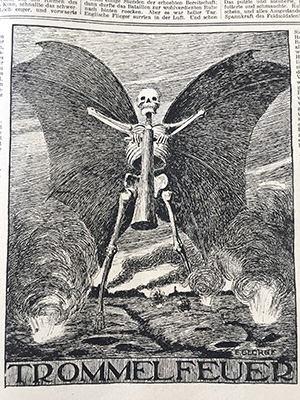Reconstructing the Psyche: Trauma, Religion and Technology through the Eyes of German Soldiers during the First World War
Lecture by Jason Crouthamel, Professor of History at Grand Valley State University in Michigan.

Abstract
How did traumatized men try to heal themselves from the trauma of the First World War? This lecture will explore the more hidden and individualized ways in which humans cope with traumatic experiences outside the control of medical authorities and categorization. Focusing on German soldiers in the First World War, we will analyse religious and spiritual responses to psychological stress. Letters, diaries and memoirs highlight the subjective language and techniques used for self-therapy and processing trauma. Finally, this lecture will offer new approaches to analyze how soldiers imagined their material environment, including technology and the weapons of war, to reconstruct bodies and minds, blending together their nerves with their machines. Taking into account the complex, self-referential codes of rituals, beliefs and customs found in the trenches, I want to propose an ethnographic approach to the other-worldly existence of the Western front and the mental universe of German soldiers.
Bio
Jason Crouthamel is a Professor of History at Grand Valley State University in Michigan. His research explores the history of trauma, masculinity, memory, and religion in Germany during the First World War. His books include The Great War and German Memory: Society, Politics and Psychological Trauma, 1914-1945 (2009), An Intimate History of the Front: Masculinity, Sexuality and German Soldiers in the First World War (2014), and Trauma, Religion and Spirituality in Germany during the First World War (2022). He has also co-edited several collected volumes on trauma, including (with Peter Leese and Julia B. Köhne), Languages of Trauma: History, Memory and Media (2021).

